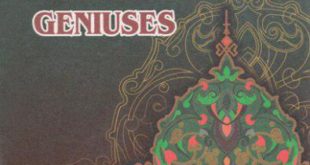Muhammadsharif Sufizoda was born in 1880 in Chust, in the family of craftsmen. His father was sufi in the mosque and a knife-craftsman. His mother Zainab was worked hard to make her son knowledgeable and handed him to Manzura otin which was much educated in the mahallah and then Muhammadsharif continued to study at mahalla’s school. From the middle of the 1890 years, Muhammadsharif began to study in one of the madrassas of Kokand.
At the beginning of the 20th century, he began to become known as poet which had Sufizoda and Vahshiy pen-names. At that time, Sufizoda’s poems, especially his humors began to worry the supporters of public-political system and colonial administrators because of disclosing defects of current system. They called the poet “bad”, “obscene” and accuse in the “atheism”. For getting rid of these persecutions and oppressions he left his homeland from 1900 to 1913 and was forced to live in other countries in wanderer life.
After a long immigration in 1913, he returned to his homeland Chust and opened a new school. His school differentiated from the “Ancient method” (Usuli Qadim) school. His pedagogical activities continued in an uncompromising struggle with the supporters “Old methods” and the Shariah-clergy. He taught modern sciences such as geography, geometry and math in his native language. He disseminated teaching the textbooks and manuals published by Munavvar kori Abdurashidkhon ugli, Abdulla Avloniy, Iskhakkhan Ibrat which were talented thinkers of the Jadids, organized a small school library to help poor children with textbooks and opened a bookstore.
He lived in India in 1915 fleeing the fanatics and the persecution of the present system, there also he taught, escaping the persecution of colonists and left to Afghanistan. At that time, several poems about education and school, science and education were published in the prestigious newspaper in Afghanistan named “Siroj ul-akhbore Afgonia” and they got to the attention of Habibullakhan which was governor of Afghanistan. The emir had the poet called and allowed to him to open a school at his request and to teach. The newly opened school of Sufizoda also gave a good impression on Amir’s son Amanullakhan. After Amanullakhan was Emir of Afghanistan, Sufizoda was employed in the Ministry of Education in responsible position. From the first days Sufizoda, who returned to his homeland from Afghanistan in 1919, worked in the field of education. Initially he came to the village of Shahand in Namangan Province, he again opened a school and was a teacher. As well as, he made up education company in Chust. However, it was known that his dreams associated with the Soviet government were mirage.
During his activity, Sufizoda did not create the textbooks or manuals for the “Method of Jadid” schools such as other Jadid teachers, from the first stage of his activity, he opened new schools, taught, protected these schools from the fanatics and supporters of “Old method”. Also, he has been engaged with artistic creation till the end of her lifetime together pedagogical activities.
He was persecuted and harassed along with Jadid intellectuals who dedicated their lives to the future of the Homeland and the nation. In 1937, Sufizoda became a victim of repression at the time when his creative power was full. Following the independence of our homeland, Muhammadsharif Sufizada’s “Selected Works” was published under the name of “Heroes of Independence” by the publishing house “Ma’naviyat” in 1999. The 33th secondary school, opened by Sufizoda in 1919 in Shakhand village of Turakurgan district of Namangan region is named after his respected name.
 Imom Buxoriy xalqaro ilmiy-tadqiqot markazi bukhari.uz
Imom Buxoriy xalqaro ilmiy-tadqiqot markazi bukhari.uz











